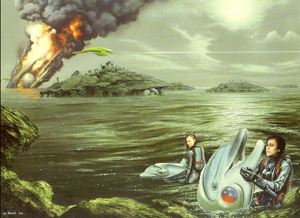
Oh, I am in such turmoil! Our Post-apocalyptic lit expert at the Mount Benson Report recommended this book to me as being well respected in the PA community. It's part of a trilogy (which at this point seem inevitable if I am going to continue reading sci-fi). But I just went to the author's website and found it there are actually two trilogies! Oh, the reading ahead of me.
Anyways, this book rocked. Most of the PA I have read is sort of near-future disasters, things that could happen in our time (No Blade of Grass, Fugue for a Darkening Island, I Am Legend) or in a very near future (most of the Ballard books). The Amtrak Wars is big future PA, taking place 900 years after the fall, with tribes of mutants ("Mutes") on the surface and a growing community of militaristic pures living underground in a super disciplined society. The underground society is built around controlling myths and restricted information. The Mutes are blamed for the wars that destroyed the world and the whole society is geared around slowly expanding their territory on the surface, killing the Mutes (and sometimes enslaving them) as they go. The Federation (as the underground society is known) drives these giant wagon trains of super high tech battle buses and fly sorties from their roof, shooting down Mutes and dropping napalm on their fields.
The Mutes, at least the ones we see, have their own myths, which are much more spiritual. Though they suffer from physical (mainly deformities) and mental mutations (most have no memory), they have a rich tribal life, are powerful warriors and some of them have special "magical" abilities. Their spiritual leader is called a Wordsmith, because he is someone with a memory. It is the Wordsmith's job to remember the 900 years of their history and to pass this on to the next Wordsmith. There are also Seers, who can see the future in some objects, and Summoners, who can control shit with their minds.
The structure of the story is divided between Steve, a hotshot rookie pilot for the federation and Cadillac, a junior Wordsmith. Their two stories are told separately, until they come together.
I am totally into the setting. There is also tons of great action (with some pretty gruesome violence). The whole thing is really well thought out, with the mores of the tribe gradually revealed and the complexities of the Federation life as well. There is tons of mystery and I really want to find out more about what is going on behind this world. Finally, the whole thing has a mellow attitude at its core. The Mutes smoke weed and do mushrooms. You know they are the good guys.
I'm totally following this series.

 The Sweet Forever is the third in the Washington Quartet (though seeing his other books, many of which take place in D.C., I'm not quite sure of the solidity of that label). It takes place ten years after the events in King Suckerman. The funk and chaos of the 70s have morphed into something more serious, something emptier. Everybody is doing blow and making money. The ghetto and the criminals have gotten harder and colder. Dmitri Karras and Marcus Clay are still the main protagonists. Marcus' record stores (of which there was just the one in King Suckerman) are succesful. Dmitri is a manager there and addicted to cocaine.
The Sweet Forever is the third in the Washington Quartet (though seeing his other books, many of which take place in D.C., I'm not quite sure of the solidity of that label). It takes place ten years after the events in King Suckerman. The funk and chaos of the 70s have morphed into something more serious, something emptier. Everybody is doing blow and making money. The ghetto and the criminals have gotten harder and colder. Dmitri Karras and Marcus Clay are still the main protagonists. Marcus' record stores (of which there was just the one in King Suckerman) are succesful. Dmitri is a manager there and addicted to cocaine. King Suckerman is the second in what is known as The Washington Quartet, the series of books, starting with the
King Suckerman is the second in what is known as The Washington Quartet, the series of books, starting with the  David Brin is very well respected and recommended. His Uplift series is well-known in the geekosphere. I read
David Brin is very well respected and recommended. His Uplift series is well-known in the geekosphere. I read 



